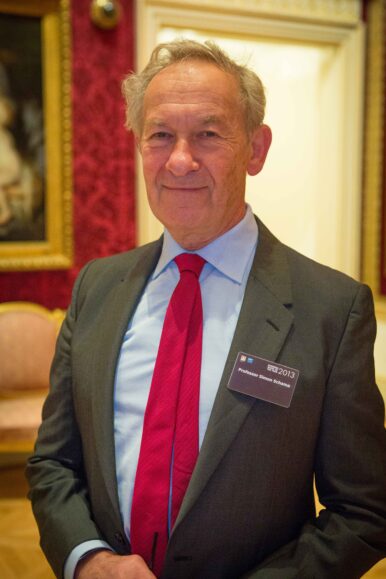
When Professor Sir Simon Schama was first approached to participate in a Darwin Lecture Series exploring the theme of Revolution, his instinctive response was that it harked back to a preoccupation from which he had long since moved on. The historian, broadcaster and prolific writer first made his name with Citizens, a history of the French Revolution published in 1989, while Rough Crossings: Britain, the Slaves and the American Revolution followed on page and screen in 2003. But more recently, his focus has spanned art history, Jewish history, Dutch history…and revolutionary zeal has faded into the background.
“My initial reaction was that I thought I’d left that behind,” he admits. “But my more serious second thought was that for once it’s not hyperbole to say that we’re facing so many existential crises. Conventional politics has become so sclerotic and tone deaf, while the challenge of converting crowd adrenaline to institutional change remains.”
An interesting time, then, to reconsider his early interest in how revolutions arise. While holding his cards close to his chest regarding the content of his lecture, he’s happy to share that it will examine whether revolutions advance or stall progress, change history or end in disappointment, and whether “the revolutionary temper has anything to say to the existential problems of our own time – environmental, biological, demographic and digital.”
Schama has been giving a lot of thought to these existential problems. His latest book, Foreign Bodies: Pandemics, Vaccines and the Health of Nations, was inspired by the world’s experience of Covid-19 and examines the history of humanity’s battle against infectious disease – a subject on which he admits to a sense of imposter syndrome in comparison to his wife, geneticist Dr Virginia Papaioannou.
His three-part BBC series The History of Now, broadcast at the end of 2022, took as its timespan his own life, which began in London on 13th February 1945, the night the Allied bombing of Dresden began. The programme explores the impact of the arts on democracy, civil rights and equality movements, politics and climate, and his distress at what he perceives as the reversal of much of the progress made in his lifetime is evident. The story of the Czech president Václav Havel, which the programme brings vividly to life, is a case in point.
“Havel is one of the great cases of someone who manages to be the embodiment of and the leader of a popular revolution who becomes a very effective president. But, the huge but of course, is actually that would never have happened had not the Soviet empire been disintegrating at that particular point. So for every wonderful epiphany in Prague there’s a horrible bloody massacre in Tiananmen Square, and they were only separated by a matter of months.”
The History of Now also illustrates the wave of optimism and opportunity on which many of Schama’s generation sailed, and which he is quick to acknowledge. Following the threat of the Cuban Missile Crisis, for which he laughingly admits he held his parents personally responsible – “I of course blamed my parents for the imminent incineration of myself and my sister; it’s one of the meaner things I did” – the ensuing decades seemed filled with a promise which now appears diminished.
“We were unbelievably lucky in our timing…it now seems kind of a lost golden age. I mean there was complete consensus about the welfare state really, the Conservative party was pretty much middle-of-the-road until Margaret Thatcher came along, and even she wasn’t going to dismantle the NHS or basic education reforms. We were in particular beneficiaries of the huge expansion of higher education…there wasn’t the kind of brutal sense of utilitarian conditions about what you might choose to do at university. We were just very fortunate. I want to avoid predictable old geezer gloom, but it is unbelievably difficult now I think.”
Schama’s wide-ranging appeal, as a writer and presenter, runs parallel with his academic life as a Professor of History and Art History at Columbia, where he has taught since 1993. He credits the historian Sir John Plumb, who taught him at Cambridge, with demonstrating that such a balancing act was possible.
“It’s not just me. There’s quite an interesting roster of historians, like David Cannadine and Linda Colley, John Brewer and Roy Porter, and we were all taught one way or the other by JH Plumb. Jack was in the minority at Cambridge in the early to mid-60s, in that he was a popular historical writer as well as an archivally rooted scholar. And he absolutely believed that the two ways of researching and writing nourished each other. His view was that history was not just for other historians and academics, but that you had to have a kind of passion for the sources and respect them in a deeply scholarly way, which then entitled you to kind of deploy your learning – if that was your thing, it wasn’t obligatory – to a wider readership.”
For the past 12 years that readership has included readers of the Financial Times, to which he contributes regularly, and which allows him an outlet for more immediate reflections on history as it unfurls.
“I’m very thankful for that, they let me have lots of space. I think when you get deep into old geezerdom you either are really doing what you’ve always done…or you become rather reckless. I’m definitely in the latter category, and part of that sort of temper is only to want to write about things that seem to matter. In the 60s we were always taught the sin of presentism, the danger of constantly projecting back contemporary issues onto your sources and dragging them onto this procrustean bed of immediacy and relevance. But I think that was sort of overdone really. I mean, the grandaddy of us all, Thucydides, he had no trouble at all writing about events in which he’d been involved. So I’m not bashful about that now.”
